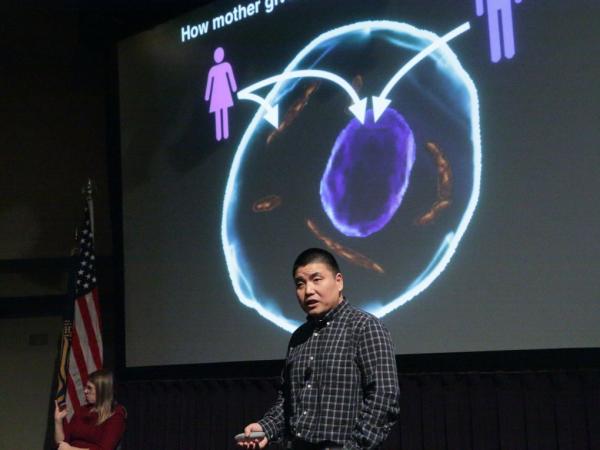Mitochondrial DNA Replication and Inheritance
Dr. Hong Xu’s lab is next in our NIH National Heart, Lung, and Blood Institute’s Orloff Science Award Series, for its success in uncovering a mechanism in female germline cells (precursors to eggs) for the selection of healthy mitochondria to pass on to offspring. Their work addresses a longstanding, fundamental question about how eggs contain healthy, vital mitochondria, thereby preventing the transmission of defective mitochondria that could cause mitochondrial diseases.
A Novel Approach to a Fundamental Question
Mitochondria are often referred to as the powerhouses of cells, and thousands of them are found in virtually all cells in the body. They convert energy from food into the fuel that cells use. Mitochondria are unique in that they contain their own DNA that is inherited solely through the female germline, or in other words, solely from mothers. This is different from cellular DNA that is inherited equally from both parents.

As organisms age, they accumulate defects (mutations) in their mitochondrial DNA. A 30-year-old mother might be expected to pass on mitochondrial DNA with 30 years of defects, but scientists have long known that this is not the case. However, how mothers avoid passing on these mutations to their offspring is a question that has puzzled scientists.
To answer that question, Dr. Xu’s lab developed a model for creating and tracking heritable mitochondrial DNA mutations using fruit flies (Drosophila). They created flies with a mixture of healthy and defective (mutant) mitochondria and tracked the amount of both present over generations. What they found was that during the development of an egg, healthy and mutant mitochondrial DNA are separated, and the healthy mitochondrial DNA replicates faster than mutant mitochondrial DNA, eventually outcompeting the mutant DNA.
The Xu team’s expertise in mitochondrial DNA genetics, along with a strong mitochondrial biology research group in the IRP, allowed them to solve the fundamental biological question of how organisms are able to stop the accumulation of mitochondrial DNA mutations from being passed on to future generations.
Congratulations to Dr. Xu and his lab for their landmark research accomplishment, demonstrating again that the IRP is home to some of the best and brightest basic scientists!
Watch Dr. Xu discuss the science for which he won this award in this video:
Related Blog Posts
This page was last updated on Monday, January 29, 2024
